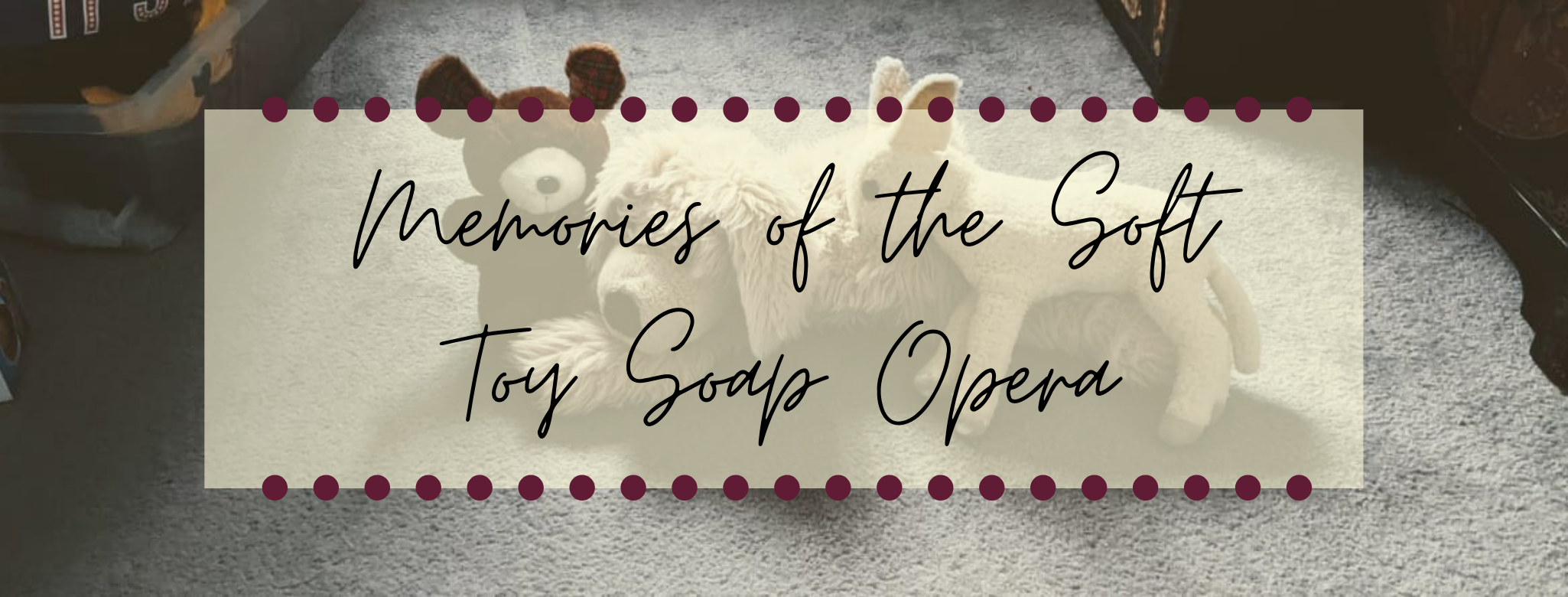Hey, everyone, how’s it going? Today was supposed to be the second part of the author branding series but, I have to admit, it just wasn’t what I felt like writing today. Along with this, there’s Christmas coming up and it just doesn’t quite feel like the right post just now. So, instead, I thought it would be much more fun to look back on some of the early influences of my writer self and, if I’m going to do that, one of the first places I’ve got to start is the soft toy soap opera.
My sister was my best friend growing up. I’m sure she thought otherwise – I was her annoying little sister, after all – but so many of my favourite memories are the two of us making up stories. There was the Abba-themed musical we made up long before Mama Mia existed. There was the traumatic one-off storylines our poor Barbies had to endure. And then there were the ongoing episodes that pretty much all of our soft toys featured in. I’m honestly not sure when it all started. Did we decide that the soft toys were the ones to have an ongoing storyline, or did that just happen? Did we plan their roles and responsibilities. Maybe my sister will know (if yes, please comment below!). I just know that it continued from early childhood, right up until we stopped playing with toys together. I still think of them in terms of the relationships we gave them. Anyway, the entire population of our soft toy collection (which was extensive) lived as some sort of court/family system. Any soft toy could become part of the ongoing story.
So, characters. I feel like the simplest way to explain this is to start with Tanya and work down. Tanya wasn’t one of the toys we played with most, but arguably she had the most power in our game. I’m pretty sure she belonged to my sister and was this beautiful white bear with an Edwardian-style(?) dress. Old and important, Tanya would occasionally come visiting for tea, but mostly she would come out when a decision had to be made. She was in charge of the court whenever we had one (which I’ll talk more about below). I can only assume that she’s gone off to visit the queen or something, because I couldn’t find her when I was clearing my parents’ house this week.
Our more commonly used toys were Donkey (the large dog pictured), Trixie (the small brown dog pictured), Lamby (I hope it’s obvious), and Treek (a small pink cat currently working on his PhD with me in Wales). The majority of storylines, from my memory, revolved around Donkey (mine) and Trixie (sister’s) as they were a married pair. They generally had a good marriage but Donkey was unfortunately a bit of a goofball. He mucked up a few times and had to go to the others for advice so that he could make it up to Trixie.

The main episode I remember (which I’m assuming is because I still find it a little devastating) is the time that Donkey and Trixie nearly got divorced. If you ever needed a sign for how embroiled in their stories I was, this is probably it. You see, any soft toy who joined our little soap opera needed to find their place. One day I got a dog that looked very like Donkey. She was big and golden and beautiful (but apparently I don’t remember her name, despite her importance in this story). She and Donkey clicked right away. Donkey, oblivious man that he was, thought she was just the perfect second best friend (Treek was his best, best friend, naturally). She, meanwhile, was definitely into him. It escalated over time and, while I think I’ve mentally blocked out how far it went, Tanya eventually intervened and called a court.
My sister and I went all out for this court. Every toy was there. We had them lining the beds, up on bookshelves, leaning against the walls. Tanya, of course, oversaw everything and sat on top of a pile of books while she listened to all the evidence. Trixie shared her hurt. Donkey shared his confusion. Treek tried to defend Donkey whilst not wholly supporting his actions. I assume Lamby was there but can’t really remember what she was doing. Presumably supporting Trixie as Treek’s opposite? And of course the golden dog was there, professing her love for Donkey and suggesting that the fact she and Donkey were so alike made them a much better match than him and Trixie. It was intense, but eventually Donkey’s character won out. He had always been a goofball in love with Trixie. He made mistakes, but he loved her. He declared this in front of the entire court, everybody celebrated, and I think we essentially shunned the golden dog for the rest of time. I feel kind of bad.
My memories of this are, as you might be able to tell, pretty vivid. I struggle to remember a lot of my childhood, but this stands out. I can see Tanya walking out to listen to the evidence. I can feel Treek’s frustration at Donkey, but also his belief that he’ll make the right choice. I remember feeling relieved when Donkey chose Trixie and she accepted him back (because I hadn’t been sure at the start of court). This was just one of many stories involving the soft toys, but this moment definitely had long-standing effects on the ways we had them interact. Nothing was ever forgotten in the court. Nobody ever suddenly flipped character without reason. And I think that this ongoing soft toy soap opera had to have had an influence on me as a writer.
I had a brief look to see if there were any studies that showed a link between between childhood roleplay and adult storytelling, but I didn’t get many hits – it would be a difficult thing to study without participant bias/inaccurate memories, along with it being hard to prove a definitive relationship between the two. There were suggestions in this article that children with imaginary friends (which I guess this is similar to?) and writers with their characters could be similar, with both being “expert pretenders” and both engaging in “practicing imaginative pretence with such frequency that it becomes ‘automatized’”. I felt slightly targeted by that last line in particular, but this is one paper with slightly different aims than my own. Unfortunately, my thoughts on how this soft toy soap opera influenced me as a writer will have to be based on anecdotal evidence.
From early childhood, my sister and I were forming an ongoing story focused on character. Sure, we had plots here and there, but the thing that ties the soft toy soap opera together is the character consistency. The court I recounted earlier exemplifies this: while the plot of that particular scenario was definitely important, it was shaped by the characters we had created and the personalities that were already established in them. As a writer, this is my bread and butter. I write for characters above anything else. If some plot event feels like it doesn’t meld with a character, it will irritate me until I can fix it. It’s also possibly why my fanfiction tastes are so heavily tied to what I view as being canonically possible, but that’s a whole different blog post.
Bouncing off of the article linked above, I would agree that characters are somewhat automised for me. I hear their voices (sometimes), I see bits of their body language, and they rebel if I’m trying to force them along a particular plotline that doesn’t fit. Shifting Sands, annoyingly, has one hugely impactful example of this. You see, there was one character that, from the start, I had planned to die. They disagreed, stubbornly closing themselves off from me until I worked out what the problem was and how to fix it. Unfortunately that meant rewriting the final chapters of five out of six perspective characters. Masaben is another much happier example, as he just turns up wherever he feels like, throws me a curveball, and then leaves me to piece it all together again. I’ve been planning book two and 100% have to blame him for everything that Kishon is going to go through there. The characters make the decisions for me and I’m just dragged along for the ride. And again, you can see this in the soft toy soap opera. That day in the soft toy court, where I didn’t know whether or not Donkey and Trixie were going to stay together, is my earliest memory of this happening. The story was led by the characters (and probably some enforcement by my sister) rather than by me.
My childhood was filled with storytelling and this has shaped me as a writer. The soft toy soap opera was a never ending story where character relationships were at the forefront, shaping what they would do when faced with a new disruptive plot in their otherwise peaceful toy utopia. Despite the limited evidence from peer-reviewed research, I do honestly think that my focus on character as an author can be linked back to these early games. So, if you ever hate what has happened in my writing, blame my parents. They bought me the golden dog, after all.
Did anyone else have a soft toy soap opera, or other ongoing stories as a child? Oh, and before I forget, if you’d like to see some some of the characters who took over my life for the past couple of years (and guess who should have died), Shifting Sands is available to buy on Amazon!



